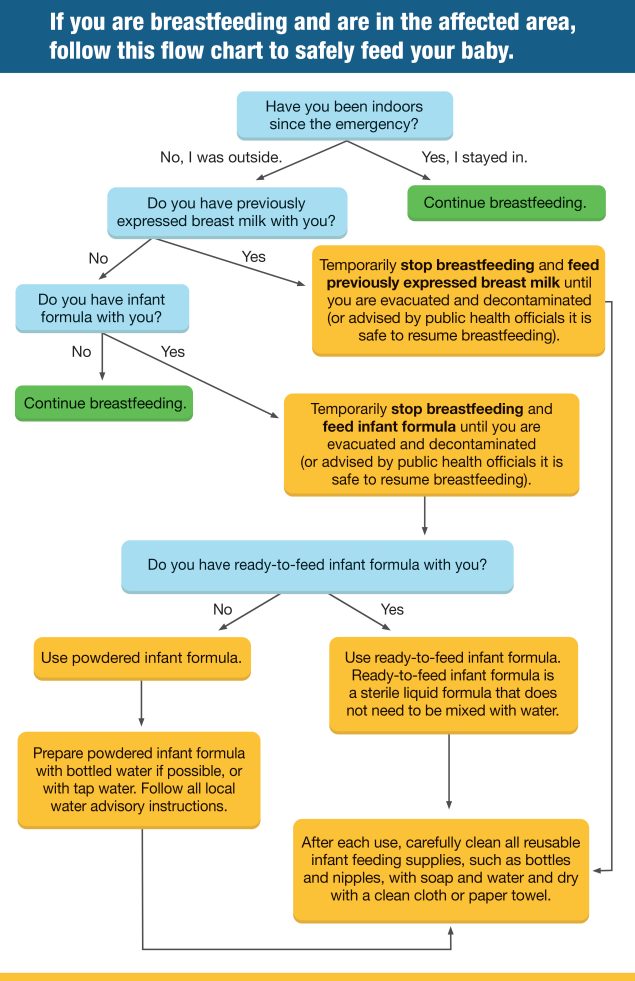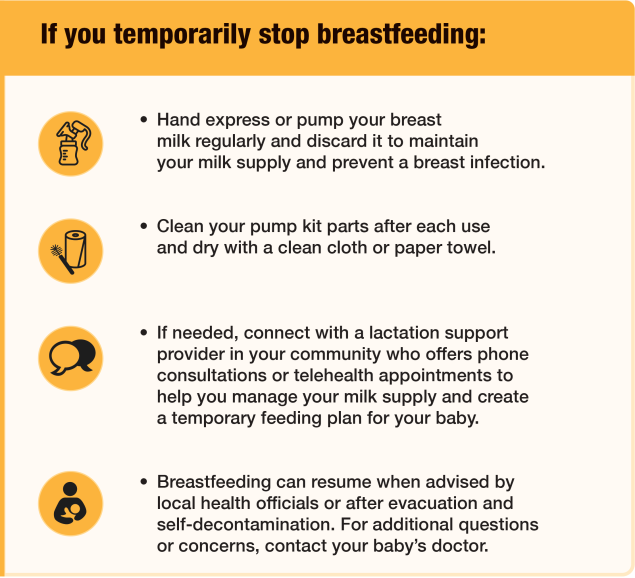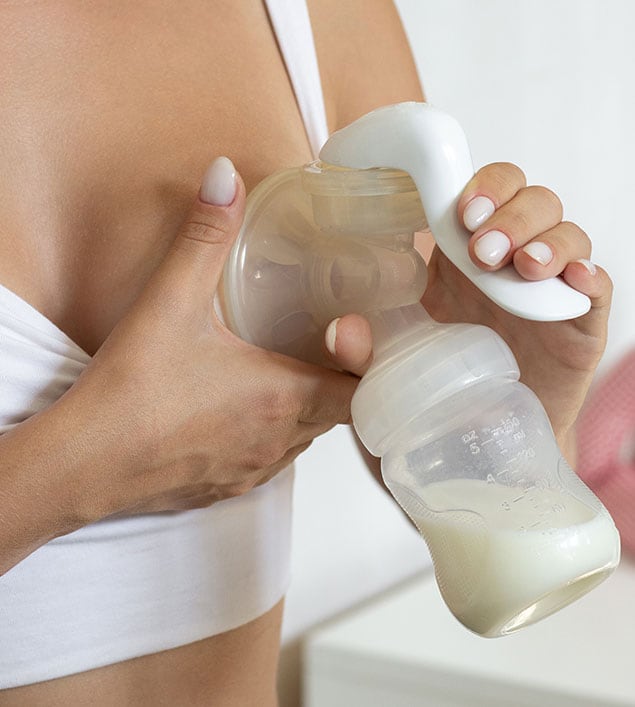Infant Feeding
The following information is general guidance for feeding babies in a radiation emergency. If a radiation emergency occurs, these instructions may be updated to reflect the specific situation. For example, guidance for feeding babies after a nuclear power plant emergency would be different than after an explosion of a dirty bomb or improvised nuclear device. Please follow instructions from local officials and stay tuned for updates.
In a radiation emergency, mothers who are in the affected area might be exposed to radiation and may also be internally contaminated if they eat, drink, or breathe in radioactive material.
Radioactive material can be passed to babies:
- through breast milk of mothers with internal contamination[PDF – 825 KB].
- through contaminated water mixed with infant formula.
- while being held and fed if their caregiver has radioactive material on their skin or clothing (external contamination[PDF – 825 KB]). Babies may swallow or breathe in these materials while feeding and can become internally contaminated.
Listen to local officials for the most up-to-date information about staying safe after a radiation emergency. Local officials will define and provide updates on the location of the affected area, the safety of the water for drinking and other uses, and evacuation instructions.
If you are outside in the affected area, take the following steps to reduce your risk of exposure and internal contamination:
- Get inside, stay inside, stay tuned.
- Wash yourself off (self-decontaminate) gently with soap and warm water to get radioactive material off your body as soon as possible to lower your risk of harm. Put on clean clothes.
- Then, decontaminate[PDF – 514 KB] your baby or child. Make sure to gently wash your child’s hands and face (especially around eyes, nose, and mouth) with soap and water or with a clean wet cloth or paper towel.
- Put clothes and towels in a plastic bag or other sealable container. Store the bag as far away from other people and pets as possible (e.g. closet, attic, basement), to prevent exposure to radiation until local health officials tell you how to dispose of it safely.
If you are in the affected area and were indoors with the doors and windows closed, it is safe to continue breastfeeding.
If you were outside in the affected area during the incident, you may be internally contaminated. Consider temporarily stopping breastfeeding and feed your baby with breast milk that was pumped and stored before the emergency or with infant formula. These options will reduce the potential risk of transmitting radioactive material to your baby through breast milk if you were internally contaminated. If you do NOT have previously expressed breast milk or infant formula, continue breastfeeding.
When feeding your baby breast milk that was pumped and stored before the emergency:
- Use previously expressed breast milk to feed your child as it will not be contaminated. Closed containers of milk that were stored inside the refrigerator or freezer are safe to use.
- Wash your hands with soap and water before feeding.
- After each use, carefully clean all infant feeding supplies such as bottles and nipples with soap and water and dry with a clean cloth or paper towel.
When feeding your baby infant formula (if you do NOT have previously expressed breast milk):
- Use ready-to-feed infant formula, if available at your current location.
- Ready-to-feed infant formula is a sterile liquid formula that does not need to be mixed with water.
- If you do not have ready-to-feed infant formula, use powdered infant formula. Do NOT leave your house or other indoor sheltering location to go get infant formula. It is safer to stay inside and continue breastfeeding.
- Prepare powdered infant formula with bottled water if possible.
- Tap water may be used if local officials say it is safe. Water that has radioactive material in it will not be made safe by boiling or disinfection. However, boiling or disinfecting water can kill germs so it’s important to follow all local water advisory instructions.
- If your baby is very young (younger than 2 months old), was born prematurely, or has a weakened immune system, you may want to take extra precautions to protect against Cronobacter.
- Wash your hands with soap and water before feeding.
- After each use, carefully clean all infant feeding supplies, such as bottles and nipples, with soap and water and dry with a clean cloth or paper towel.
If you do NOT have previously expressed breast milk or infant formula:
- Continue breastfeeding. It is important to stay inside and make sure your baby is hydrated and fed.
- Wash your hands, nipples, and breasts thoroughly with soap and warm water before breastfeeding or expressing milk.
If you are advised to visit a Community Reception Center (CRC) when evacuating, tell CRC staff how you are feeding your baby so that they can help you or advise you on how to feed your baby safely.
Breastfeeding can resume when advised by local health officials or after evacuation and self-decontamination. For additional questions or concerns, contact your baby’s doctor.
Cup feeding is an alternative way to feed babies with breast milk or infant formula. This is helpful when infant feeding items cannot be cleaned properly. You can use disposable cups and then throw them away after use to protect your baby from germs that can grow in bottles and nipples.
If you are in the affected area, feed your baby with one of the options below.
Use ready-to-feed infant formula, if available at your current location.
- Ready-to-feed infant formula is the safest option for formula fed infants during an emergency.
- Ready-to-feed infant formula is a sterile liquid formula that does not need to be mixed with water.
If you do NOT have ready-to-feed infant formula, use powdered infant formula.
- Prepare powdered infant formula with bottled water, if possible.
- Tap water may be used if local officials say it is safe. Water that has radioactive material in it will not be made safe by boiling or disinfection. However, boiling or disinfecting water can kill germs so it’s important to follow all local water advisory instructions.
- If your baby is very young (younger than 2 months old), was born prematurely, or has a weakened immune system, you may want to take extra precautions to protect against Cronobacter.
Wash your hands with soap and water before feeding. After each use, carefully clean all infant feeding supplies, such as bottles and nipples, with soap and water and dry with a clean cloth or paper towel.
If you are advised to visit a Community Reception Center (CRC) when evacuating, tell CRC staff how you are feeding your baby so that they can help you or advise you on how to feed your baby safely.
Resources for Professionals



